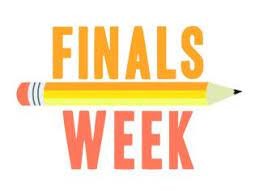
How to Handle Finals Frenzy: Advice from our Professors
As many of us are too aware, finals season is upon us. As we run around like chickens with our heads cut off, scrambling to get all of our assorted projects, essays, and exams accomplished, our professors cheer us on and advise us on how to survive this tumultuous time.
If you are looking for a place to start being productive, Theatre Professor Neena McLain, recommends making a list of all of your assignments and breaking down the order you complete them by priority. Consider what assignments are due first as well as the significance of how they will impact your grade.
“Nothing feels better than when you mark things off,” Professor McLain says, “If it’s all rolling around in your head, it can be overwhelming.”
Although all-night cram sessions are the go-to study strategy of many students, professors discourage this. Instead, they recommend starting early and studying in intervals, taking breaks between each interval.
Dr. Greg Schneller, a psychology professor explains, “Our brains are not built to focus intensely for long periods of time. Try a twenty-ten study strategy. Study for twenty minutes, then take a ten minute break and do something else. The ten minutes can serve as a reward for the twenty minutes of intense focus.”
During those breaks you can take a walk like Professor McLain, write in a journal like English Professor Cole Thompson, or engage in breathing exercises like Dr. Schneller.
“I use slow, intentional breathing when I find myself feeling very stressed,” Dr. Schneller says, “Accompanying this, I say brief, repetitive prayers with each breath. For example, ‘You are my strength, Lord,’ while inhaling [and] ‘You are in control,’ while exhaling.”
If you can focus on your work while being with friends, Professor Cole Thompson suggests students to study in groups, “It can add some fellowship and fun to studying. Plus, other students may contribute notes or insights that will benefit you.”
Remember that finals are not the end of the world and your health is worth more than your grade. Sleep is shown to improve memory and information retention, so make sure you get adequate rest. Eat well and drink plenty of water. If you wear down your body, your mind will not work at full capacity.
Dr. Greg Schneller says, “You can do more than you feel that you can. We all feel tired from a difficult year, but we have only a few laps left in this race. Even when you feel like you cannot go anymore, you usually can, just one step at a time. Finish strong even if you don’t feel like it.”
“Stay strong through finals,” Professor Thompson says, “Put forth your best effort, and know that fun activities await, and that you will enjoy those activities more if you can look back on a successful spring semester.”
Whether you are studying notes, completing projects, or writing papers, I wish all of us luck on our future endeavors. We’ll get through this!
